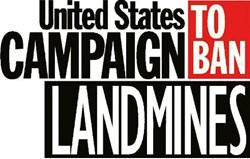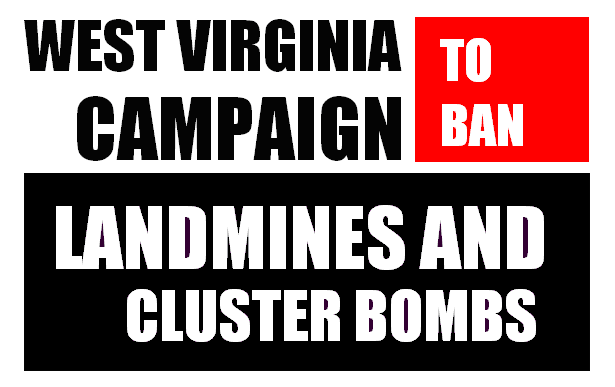
President Barack Obama should conclude his administration’s review of United States’ policy on banning antipersonnel landmines with a decision to join the 1997 Mine Ban Treaty, said the United States Campaign to Ban Landmines on the eve of the International Day for Mine Action. “When it comes to the harm caused by landmines, the U.S. has spent billions to treat the symptoms, but it refuses to endorse the cure of the ban treaty,” said Mary Wareham of Human Rights Watch, chair of the U.S. Campaign to Ban Landmines, a coalition of more than 400 non-governmental organizations. “It’s time for the U.S. to match its financial commitment to clearing landmines with a political commitment to ensure it never uses these indiscriminate weapons again.”
The U.S. is not among the 161 nations that are party to the 1997 treaty banning antipersonnel landmines, which prohibits all use, production, and trade of the weapons, requires destruction of all stockpiles, and requires clearance of contaminated land and assistance to victims. The Mine Ban Treaty members include all European Union countries, all NATO members except the U.S., all nations in sub-Saharan Africa, all countries in the Western Hemisphere except Cuba and the U.S., many countries in Asia-Pacific, and several nations from the Commonwealth of Independent States.
The Clinton Administration in 1997, set the objective of joining the Mine Ban Treaty in 2006, but the Bush Administration reversed course in 2004. At a Mine Ban Treaty meeting in Geneva in December 2013, the U.S. announced that the policy review initiated in 2009 is “pressing forward to a conclusion” but gave no indication of when a decision would be revealed. The policy decision is understood to be in the hands of President Barack Obama.
The U.S. is the world’s largest contributor to global mine clearance and victim assistance programs. According to theLandmine Monitor initiative by the International Campaign to Ban Landmines (ICBL), the U.S. provided more than $2 billion to mine action from 1993-2013. In 2012, the U.S. contributed $134.4 million to mine action in 30 countries and three territories through more than 40 organizations. Afghanistan and Iraq received the largest contributions, accounting for almost half (48%) of U.S. funding in 2012.
“Most nations that receive U.S. mine action funds have joined the Mine Ban Treaty, as they recognize the negative long-term impact these weapons have on civilian populations,” said Wareham. “Why can’t the U.S. do the same and ban landmines now?”
Two-thirds of the nations that received U.S. mine action support in 2012 are party to the Mine Ban Treaty: Afghanistan, Angola, Bosnia and Herzegovina, Cambodia, Colombia, Croatia, DR Congo, Ethiopia, Iraq, Jordan, Mozambique, Palau, Peru, Serbia, Solomon Islands, Somalia, South Sudan, Tajikistan, Yemen, and Zimbabwe.
The U.S. has not used antipersonnel mines since 1991 (in the first Gulf War), has not exported them since 1992, and has not produced them since 1997. However, it still retains millions of stockpiled antipersonnel mines for potential future use.
The U.S. Campaign to Ban Landmines has repeatedly urged that the outcome of the policy review be a decision to join the Mine Ban Treaty as soon as possible, to prohibit the use of antipersonnel mines immediately, and to begin destruction of all stocks of antipersonnel mines. In a January 31, 2014 letter to President Obama, the leadership of the U.S. Campaign to Ban Landmines reiterated this call.
The U.S. Campaign to Ban Landmines urges the U.S. to conclude its landmine policy review no later than the Mine Ban Treaty’s Third Review Conference, which opens in Maputo, Mozambique on June 23, 2014. The U.S. Campaign to Ban Landmines is the U.S. affiliate of the International Campaign to Ban Landmines, co-laureate together with former ICBL Coordinator Jody Williams of the 1997 Nobel Peace Prize.
In 2005, the United Nations General Assembly declared that 4 April of each year shall be observed as the International Day for Mine Awareness and Assistance in Mine Action. To mark 2014 Mine Action Day, events are planned at the United Nations in New York, at the U.S. Capitol in Washington DC, and in nations around the world.
For more information, see:
· Mines Advisory Group America, photo exhibition at U.S. Capitol:http://www.magamerica.org/surviving-the-peace-photography-exhibit
· U.S. Campaign to Ban Landmines letter to President Obama, January 31, 2014:http://www.uscbl.org/fileadmin/content/images/Letters/USCBL_Letter_to_Obama_31Jan2014.pdf
· Report on “United States and the Mine Ban Treaty” event, February 19, 2014:http://bit.ly/1kj7YxO
For more information, please contact in Washington DC:
· Mary Wareham, Human Rights Watch: +1-202-612-4360 or +1-646-203-8292 (mobile)or [email protected]
· Mica Bevington, Handicap International, +1-240-450-3531 or [email protected]
Please visit www.banminesusa.org
